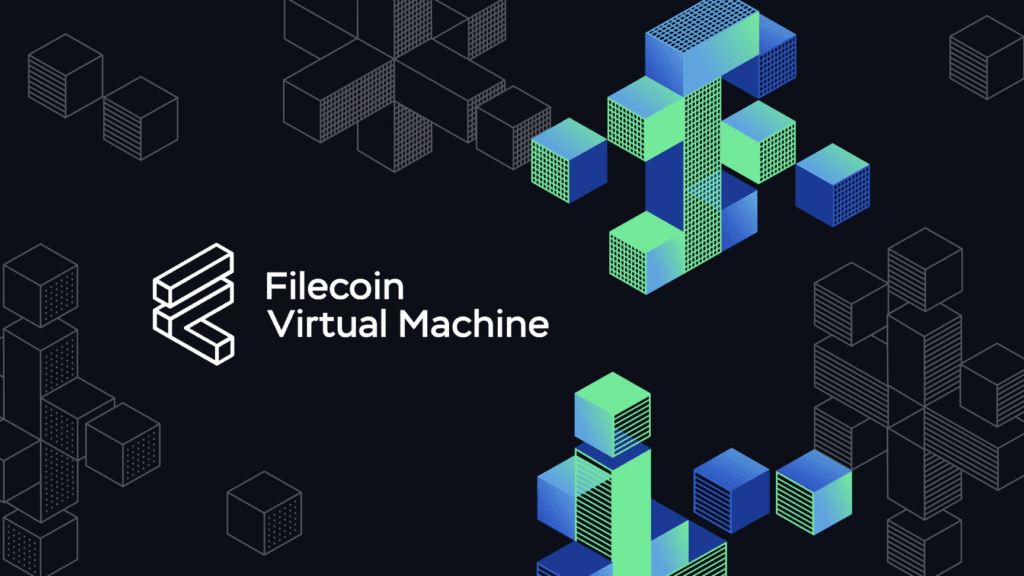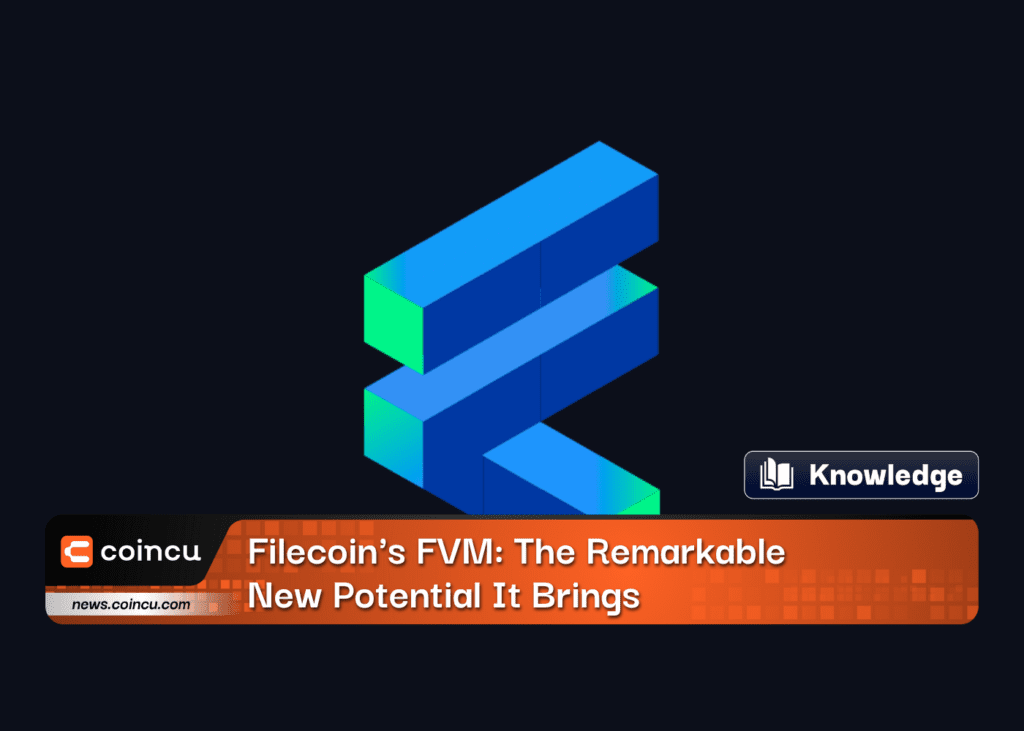Key Points:
- Filecoin Virtual Machine is giving new life to the Filecoin ecosystem.
- FVM can be EVM compatible, helping Filecoin to form cross-chain bridges between chains dynamically.
- The addition of FVM to Filecoin will bring the network into a full-fledged layer-1 blockchain.
The decentralized storage system Filecoin (FIL) has seen an increase in income owing to the engagement of storage providers and consumers over the last year. The active participation of these stakeholders suggested that both demand and supply increased across the board.

The impending introduction of the Filecoin Virtual Machine (FVM) is gaining momentum in the Filecoin network. The March 14, 2023, release of the FVM virtual machine has altered the current Filecoin ecosystem and is predicted to unlock the full potential of the open data economy.
Filecoin may transfer its competitive services to other blockchain apps thanks to an interoperable network. This method enables dApps on each blockchain to service their data requirements by using hundreds of storage providers, resources, and potential sub-networks on the Filecoin network.
Importantly, FVM already has the backing of Binance. According to the official statement, Binance supports Filecoin’s Network v18 Hygge update. Let’s go with Coincu to find out the potential that FVM brings to Filecoin.
What is FVM?
Filecoin is now recognized as the biggest decentralized storage network, with around 18 EiB of storage capacity available to the whole globe through hundreds of data providers worldwide. Nevertheless, with the newly introduced Filecoinv16 network update, storage is just the beginning. Skyr has finished the first stage of the Filecoin Shirt Server’s development. Developers may now compute and analyze data on Filecoin.
FVM is defined as Protable Storage + Smart Contract (explicit storage proof combined with Smart Contract). In other words, FVM will let you create your own smart contracts that execute on-chain computations against Filecoin Network state data. Enabling users to execute on-chain computation programmatically on distributed storage is an essential innovation since provable enables for different use cases and downstream applications to arise both on-chain and off-chain.
Consider the storing and retrieval capability to be the Layer 0 architecture of Filecoin. Filecoin now has Layer 1 capabilities thanks to the ability to do calculations on-chain.
What new features does FVM upgrade bring?
The Filecoin Virtual Machine is a runtime environment that allows developers to publish smart contracts to the Network. FVM, like the Ethereum Virtual Machine (EVM), would increase the programmability of the FIL blockchain, unlocking the promise of an open data economy.
Tokenized datasets and data DAOs will allow users to trade datasets and data DAOs as tokens and request computations on that data such as validation, analysis, extraction, and so on… quicker and with more security.
The FVM will convert Filecoin into a fully functional layer-1 blockchain. With the update, FVM will be compatible with EVM, allowing FIL to support several virtual machines.
Consider an overlay network of nodes patrolling the network and completing random transactions with Storage Providers (SPs) to assess critical parameters such as quality of service, performance, latency, and performance. These nodes may then keep the SP’s reputation score on-chain, making it traceable and verifiable while also letting the user choose the SP’s terms of service for their data. They create their own content.
Since Filecoin is a decentralized data storage system, implementing the FVM will allow more individuals to generate and profit from data. FVM would let developers create Filecoin-based apps, markets, and decentralized organizations. It would also lower gas prices, increase transaction speed, and improve DeFi support on Filecoin.
There are several additional applications for unlocking using FVM. The only constraint is the developer’s capacity to create. Other characteristics that may emerge include:
- NFTs are issued, traded, and stored over a single network.
- Storage bonuses and an auction system are also available.
- Layer 2 bridging should be enabled.
- DeFi futures contracts and derivatives are created on the repository.
- Mortgage financing with conditions.
These features have heightened the community’s excitement for the FVM debut, which has aided the FIL token price surge. The present increase in trade volume indicates that either more individuals have already begun using Filecoin or that existing users have boosted their activity in anticipation of tomorrow’s launch.
FVM is based on the WASM core and the standard SDK included with Rust. Some builders in the community are working on various FVM SDKs, such as the AssemblyScript SDK and the experimental TinyGo SDK.
FVM’s immediate EVM compatibility is also being worked on. This implies that any current EVM use case may pass through and make use of the Filecoin storage layer. Similarly, developers may create for FVM using their current Solidity abilities as well as an Ethereum ecosystem tool like Hardhat or a wallet.
FVM integration projects on the Filecoin ecosystem
SFT Protocol
The SFT Protocol is built on the Substrate architecture, and the Layer0 underlying application public chain solves those assets that are locked by stake tokens and cannot be liquidated in the medium and long term, such as FIL, DOT, and ETH2. Assets may be freely transferred.
Users can obtain SFT in the SFT Protocol for SFT transactions, stake mining/liquidity mining, DeFi lending, DAO governance, NFT casting, public chain Node application deployment, hardware infrastructure calls, and so on by staking the original public chain tokens and minting SFT tokens to solve liquidity.
The SFT Protocol provides native token stake and redemption, as well as deposit and withdrawal at any moment, with all operations conducted through the decentralized deployment of smart contracts and verification nodes.
SFT’s purpose is to use Substrate as the basis to unlock medium and long-term assets that are stake-locked and non-liquidate. The initial phase employs Filecoin, enabling users to join, transfer, withdraw, or redeem in a variety of ways, as well as giving completely customizable staking mechanisms and incorporating DeFi capabilities. SFT will incorporate additional public chains in the future and create a globally distributed architecture.
MFIL
MFIL is a decentralized liquidity staking product built by MFIL DAO that is based on FVM. Mining APR income may be generated by holding MFIL. MFIL is generated by minting SP node staking coins that are assessed at a 1:1 ratio by the MFIL DAO. The profits of MFIL are derived from the real mining income of SP nodes.
MFIL examines storage providers’ nodes and assigns them to third-party asset management organizations. The stakable FIL coins that have been examined for the nodes are manufactured into MFIL at a 1:1 ratio.
Users may swap FIL for MFIL at a 1:1 ratio, and owning MFIL entitles them to the yearly mining yield of the same number of stakable coins. In the decentralized exchange, users may swap MFIL for FIL at any moment. To keep the mining income of MFIL always 1:1 with the stakable currencies, if an SP storage provider wishes to redeem a node, they must acquire and destroy the appropriate amount of MFIL when the node was produced.
FILL
FILL is a liquidity pool that will be built as a completely open-sourced, decentralized, algorithm-based lending platform on FVM. FILL creates a market for FIL token holders to deposit for passive interest income and SPs to borrow FIL for storage.
Unlike other loan markets, FILL does not require storage providers to collateralize Fiat currencies or other digital assets; instead, the storage providers’ current account balance and potential revenue serve as collateral. The protocol pledges the potential cash from storage mining before the repayment by taking over the storage provider’s Beneficiary Address.
The borrowing interest rate is neither pre-defined nor set but rather constantly changed by market conditions, such as supply and demand. Increased demand for borrowing FIL leads to a greater utilization rate for the liquidity pool, which raises the borrowing interest rate, while larger deposits lower the utilization rate and lower the borrowing interest rate.
Flame Launch
Flame Launch is a decentralized launch platform based on the Filecoin ecosystem that integrates the Internet social network and on-chain asset data to enable services such as screening, rating, and adaptation.
This provides investors with detailed project information, allowing them to make better-educated investment choices.
To encourage user engagement, the Flame Launch platform enables project owners to launch a variety of campaigns, such as IDOs, white lists, interactive tasks, and so on. The Flame Launch Platform may notarize project parties and timeliness records and generate a unique image of users utilizing DID technology to assure the market environment’s legitimacy and the trading mechanism’s fairness.
At the same time, the Flame Launch platform employs sophisticated security and protection procedures to safeguard the safety of participants, digital assets, and privacy. Every transaction will be recorded on the blockchain and shown in complete transparency, enabling users to always know their digital assets’ status.
Essentially, Flame Launch is a completely decentralized launch platform that offers a more safe, transparent and fair market environment via sophisticated technology and flawless protocols, hence improving services for investors and project partners.
DISCLAIMER: The Information on this website is provided as general market commentary and does not constitute investment advice. We encourage you to do your own research before investing.
Join us to keep track of news: https://linktr.ee/coincu
Harold
Coincu News





